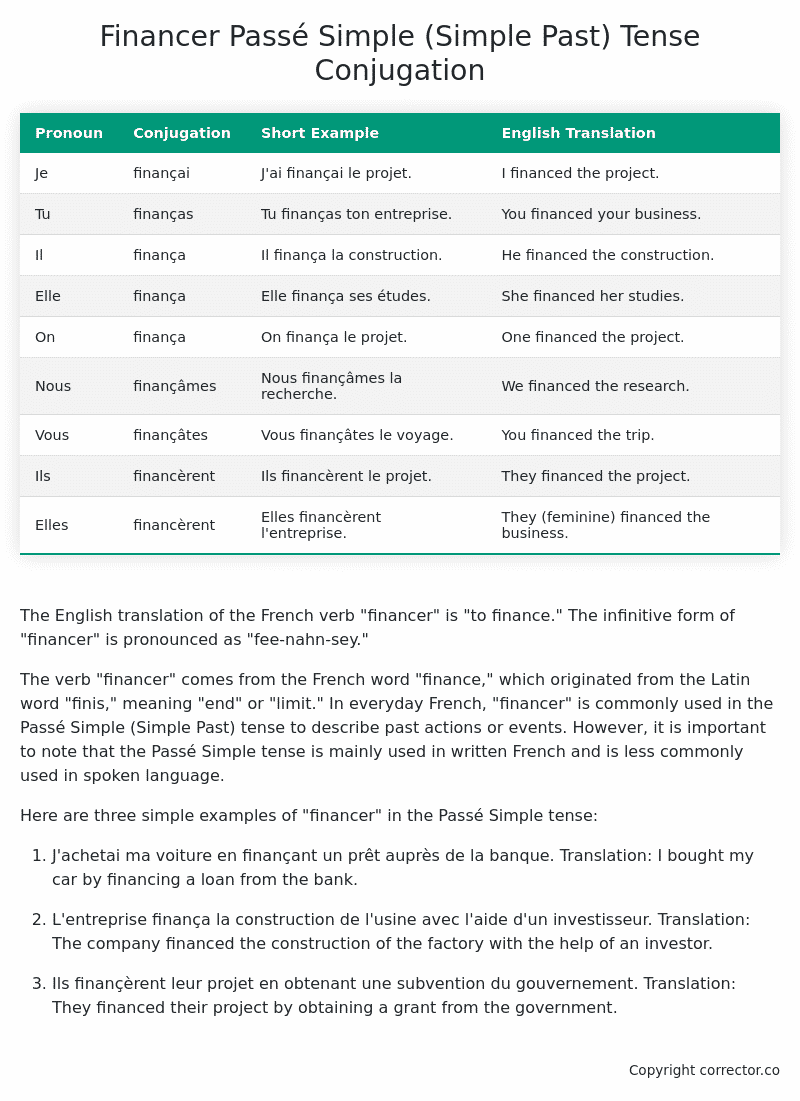Passé Simple (Simple Past) Tense Conjugation of the French Verb financer
Introduction to the verb financer
The English translation of the French verb “financer” is “to finance.” The infinitive form of “financer” is pronounced as “fee-nahn-sey.”
The verb “financer” comes from the French word “finance,” which originated from the Latin word “finis,” meaning “end” or “limit.” In everyday French, “financer” is commonly used in the Passé Simple (Simple Past) tense to describe past actions or events. However, it is important to note that the Passé Simple tense is mainly used in written French and is less commonly used in spoken language.
Here are three simple examples of “financer” in the Passé Simple tense:
-
J’achetai ma voiture en finançant un prêt auprès de la banque.
Translation: I bought my car by financing a loan from the bank. -
L’entreprise finança la construction de l’usine avec l’aide d’un investisseur.
Translation: The company financed the construction of the factory with the help of an investor. -
Ils finançèrent leur projet en obtenant une subvention du gouvernement.
Translation: They financed their project by obtaining a grant from the government.
Table of the Passé Simple (Simple Past) Tense Conjugation of financer
| Pronoun | Conjugation | Short Example | English Translation |
|---|---|---|---|
| Je | finançai | J’ai finançai le projet. | I financed the project. |
| Tu | finanças | Tu finanças ton entreprise. | You financed your business. |
| Il | finança | Il finança la construction. | He financed the construction. |
| Elle | finança | Elle finança ses études. | She financed her studies. |
| On | finança | On finança le projet. | One financed the project. |
| Nous | finançâmes | Nous finançâmes la recherche. | We financed the research. |
| Vous | finançâtes | Vous finançâtes le voyage. | You financed the trip. |
| Ils | financèrent | Ils financèrent le projet. | They financed the project. |
| Elles | financèrent | Elles financèrent l’entreprise. | They (feminine) financed the business. |
Other Conjugations for Financer.
Le Present (Present Tense) Conjugation of the French Verb financer
Imparfait (Imperfect) Tense Conjugation of the French Verb financer
Passé Simple (Simple Past) Tense Conjugation of the French Verb financer (You’re reading it right now!)
Passé Composé (Present Perfect) Tense Conjugation of the French Verb financer
Futur Simple (Simple Future) Tense Conjugation of the French Verb financer
Futur Proche (Near Future) Tense Conjugation of the French Verb financer
Plus-que-parfait (Pluperfect) Tense Conjugation of the French Verb financer
Passé Antérieur (Past Anterior) Tense Conjugation of the French Verb financer
Futur Antérieur (Future Anterior) Tense Conjugation of the French Verb financer
Subjonctif Présent (Subjunctive Present) Tense Conjugation of the French Verb financer
Subjonctif Passé (Subjunctive Past) Tense Conjugation of the French Verb financer
Subjonctif Imparfait (Subjunctive Imperfect) Tense Conjugation of the French Verb financer
Subjonctif Plus-que-parfait (Subjunctive Pluperfect) Tense Conjugation of the French Verb financer
Conditionnel Présent (Conditional Present) Tense Conjugation of the French Verb financer
Conditionnel Passé (Conditional Past) Tense Conjugation of the French Verb financer
Conditionnel Passé II (Conditional Past II) Tense Conjugation of the French Verb financer
L’impératif Présent (Imperative Present) Tense Conjugation of the French Verb financer
L’impératif Passé (Imperative Past) Tense Conjugation of the French Verb financer
L’infinitif Présent (Infinitive Present) Tense Conjugation of the French Verb financer
L’infinitif Passé (Infinitive Past) Tense Conjugation of the French Verb financer
Le Participe Présent (Present Participle) Tense Conjugation of the French Verb financer
Le Participe Passé (Past Participle) Tense Conjugation of the French Verb financer
Struggling with French verbs or the language in general? Why not use our free French Grammar Checker – no registration required!
Get a FREE Download Study Sheet of this Conjugation 🔥
Simply right click the image below, click “save image” and get your free reference for the financer Passé Simple tense conjugation!

Financer – About the French Passé Simple (Simple Past) Tense
Formation
Usage
Narration
Historical Context
Interactions with other tenses
Passé Composé
Imparfait
Conditional and Subjunctive
Summary
I hope you enjoyed this article on the verb financer. Still in a learning mood? Check out another TOTALLY random French verb conjugation!


